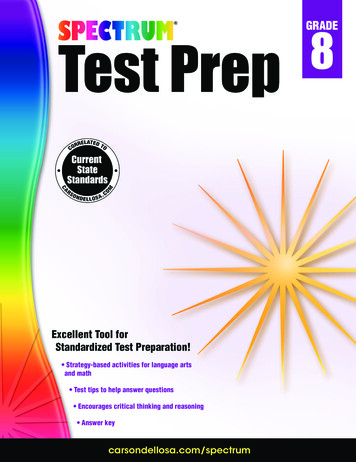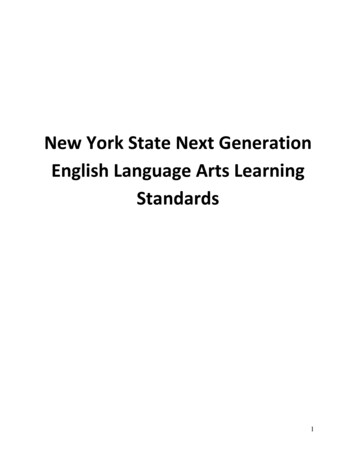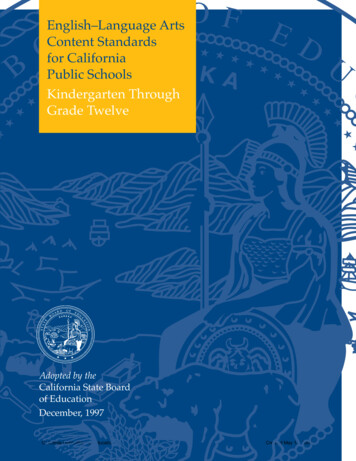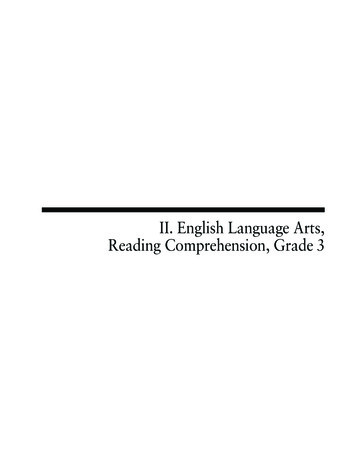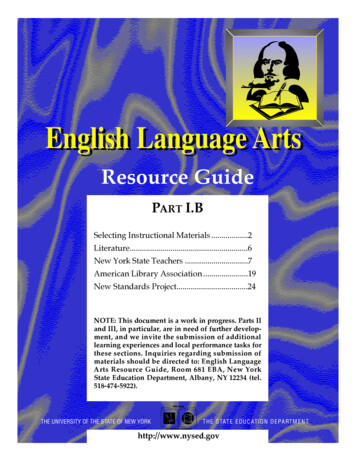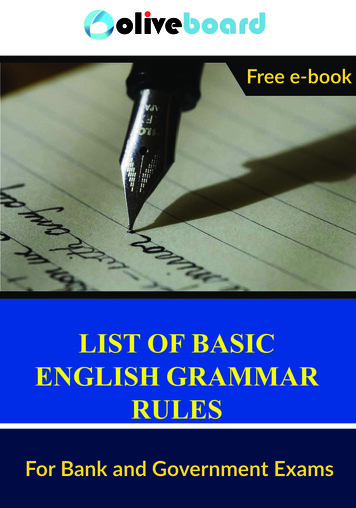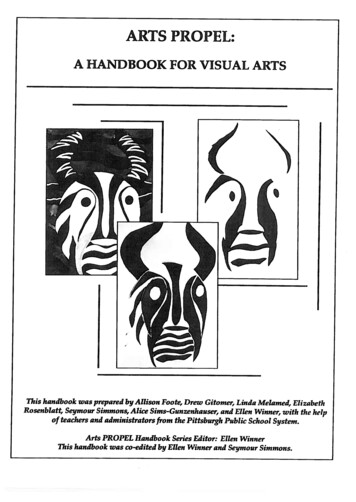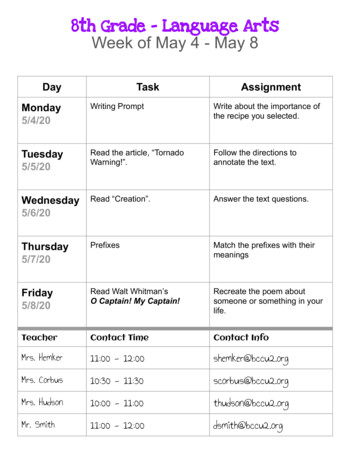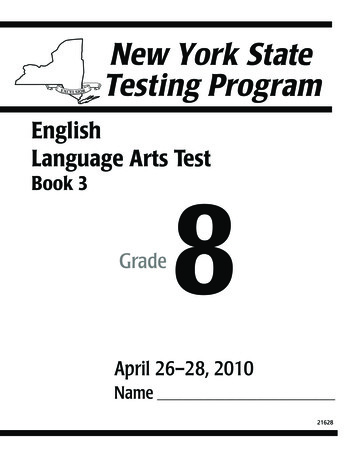
Transcription
EnglishLanguage Arts TestBook 3Grade8April 26–28, 2010Name21628
Tips for taking the testHere are some suggestions to help you do your best: Be sure to read carefully all the directions in the test book. Plan your time. Read each question carefully and think about the answer beforewriting your response.In this test, you will be writing about texts that you will be reading. Your writingwill be scored on how clearly you organize your writing and express what you have learned how accurately and completely you answer the questions being asked how well you support your responses with examples or details from the texts how correctly you use grammar, spelling, punctuation, capitalization, andparagraphingWhenever you see this symbol, be sure to plan and check your writing.Acknowledgments CTB/McGraw-Hill LLC is indebted to the following for permission to use material in this book:Excerpt from The Rufus Chronicle: Another Autumn by C. W. Gusewelle, copyright 1996 by C. W. Gusewelle.Used by permission of The Ballantine Publishing Group, a division of Random House, Inc.Photograph of a Golden Retriever sitting in armchair (RF Image No. 42-16421557), copyright DLILLC/Corbis.Used by permission.Excerpt and illustration from “The Gift of Reason” by Walter D. Edmonds, illustration by Jim Arnosky, text copyright 1977by Walter D. Edmonds; art copyright 1977 by Jim Arnosky. Text reprinted by permission of Harold Ober Associates,Incorporated, and the artist.Developed and published by CTB/McGraw-Hill LLC, a subsidiary of The McGraw-Hill Companies, Inc., 20 Ryan Ranch Road, Monterey, California 93940-5703.Copyright 2010 by the New York State Education Department. All rights reserved. No part of this publication may be reproduced or distributed in any form orby any means, or stored in a database or retrieval system, without the prior written permission of the New York State Education Department.
Book 3Reading and WritingDirectionsIn this part of the test, you are going to read a passage called “Rufus” and a passage called“The Gift of Reason.” You will answer questions 31 through 34 and write about what youhave read. You may look back at the passages as often as you like.Go On Secure material Do not reproduce. Do not discuss contentsuntil end of designated makeup schedule.Book 3Page
Rufusby C.W. GusewelleThe bird dog is lost again.Not lost in the literal, physical sense.He’s still around, and still a friend. But Ihave lost him as a useful working animal,which hunting dogs are supposed to be.It happened during this summer’s spellof blistering heat when he discovered air conditioning.The bedroom has a window unit. When the awful heat came, he immediately noticedthe difference between the pleasant nights in his chair and the sweltering days outside.And it occurred to him he might correct this situation. Were not the cats in there andcool? Was not the old dog snoozing in the lap of air-conditioned comfort? Then whyshould he, a dog of real utility, provider of fowl for the family table, not have some of thisluxury?He pressed his hopeful face against the outer glass, but our hearts were hard. Topresent his case in a more dramatic way, he began sitting on a patio table, glaringin accusingly at eye level through a kitchen window. It yielded nothing, though. Heremained outside.So he learned to open the back door. That’s right, learned to open it himself! Oneafternoon I looked up from my typewriter and there he was, indisputably inside, lookingimmensely pleased by his new competence. As far as he’s concerned, the case is closed.He’s in where it’s cool, and it’s not negotiable. He makes himself as small as possible andrarely moves.The other day Katie called him, suggesting it might be time to trot outside on asanitary errand. He didn’t budge—just looked around the room to see if, by somecoincidence, she might be speaking to another dog of the same name. So I called him, andhe growled.As you probably know, the main virtue of a fine bird dog, apart from a keen nose,is unquestioning obedience. The master’s command is his highest law. Defiance isunthinkable. He is indifferent to the elements. If game is downed, he will endure anydiscomfort to find and bring it to hand. In a word, there is nothing a bird dog will not dofor his master.Wrong! This one will not even leave his chair in an air-conditioned room.When he was chosen from his littermates several years ago, I was looking for a pupwith intelligence and staying power. That’s exactly what I got. Rufus is no fool. And he’sstaying cool.Page Book 3 Secure material Do not reproduce. Do not discuss contentsuntil end of designated makeup schedule.
31In the passage “Rufus,” the author describes Rufus as having intelligence and staying power.Using details from the passage, complete the chart below with one example of Rufus’sintelligence and one example of his staying power.Quality Exhibitedby RufusExample from the PassageIntelligenceStaying PowerGo On Secure material Do not reproduce. Do not discuss contentsuntil end of designated makeup schedule.Book 3Page
32PageThe author of the passage says that he lost Rufus as a useful working animal during asummer heat spell. Explain why the author makes this comment about his dog. Use detailsfrom the passage to support your answer. Book 3 Secure material Do not reproduce. Do not discuss contentsuntil end of designated makeup schedule.
The Gift of Reasonby Walter D. EdmondsWalter D. Edmonds was a writer from upstate New York. After seeing dogs help eachother, he wondered whether animals had the power to reason. In this part of hisarticle, he tells of another encounter with animals.I am carried back to a sweltering midday in August many summers ago. I am fishingdown Cold Brook, a small stream that rises beyond our back line and circles throughthe northeast corner of the place, and then for better than two miles runs through aheavy growth of alders till it meets the Black River at Hawkinsville. I used to fish it everysummer, because no matter how warm the river water might have become, a trout outof the icy water of Cold Brook was always prime. I also fished it because it was a verysporting stream.The heavy growth of alders made using a fly impossible. Instead, to find your troutyou floated a worm down the current into the pockets under the alder roots where thewater was seldom more than a foot deep.I do not know when the two swamp sparrows discovered me. I was so preoccupiedthat it might have been several minutes before their insistence brought them to myattention. But then, there they were in the bush beside me, two small brown birds withdull rusty caps and undistinguished plumage. They were profoundly upset, spreadingtheir wings, repeating over and over a rough single note.When I stopped fishing, they flew to another bush upstream and repeated their antics.I thought that perhaps they had new hatched babies somewhere nearby and wanted to leadme away from them, but as I had no intention of harming them, I resumed my fishing,passing around the next downstream clump of alders to try a new riffle.1Immediately the two birds changed their tactics. In an instant they were in front ofme, fluttering before my face almost like flycatchers, still uttering their distressed chinknote.2 I stopped again to watch them. It would have been impossible to continue fishingwith that flurry of wings going on almost in my face. Once more they flew to a bushupstream, but the minute I faced downstream again, they were back around my head.I put my rod down, leaning it against a bush, and watched them. They quieted, butcontinued to flutter their wings. It came to me, how I do not know, that they were nottrying to lead me from something. They wanted me to come with them.1riffle: a stretch of water2chink note: a sharp sound Secure material Do not reproduce. Do not discuss contentsuntil end of designated makeup schedule.Go OnBook 3Page
As soon as I started back upstream in their direction, they fluttered on, much lessnoisily now. I followed them for perhaps a hundred feet, and then they led me away fromthe brook until they came to rest in another alder clump. Their voices were much quieternow; in an odd way they sounded reassuring. I looked where they were looking.There, its tiny leg caught in a vertical cleft of an alder stem, hung a sparrow nestling.It hung totally inert. It gave no sign that it might be alive when I went up to it, not evenwhen I took the little body in one hand and with the other opened the cleft. I held it forseveral minutes cupped in my hands. Finally its eyes opened, and it stirred a little onmy palm.Only then did I realize that both birds had come close to me. They watched the youngbird as intently as I. And in the end the little body gathered itself. The stretched leg movedunder it. I put it on a branch two feet or so away from its parents. They had apparentlyno fear of me. They did not offer to move away. When I saw the toes of the baby takehold of the branch, I released it and left them so. I resumed my fishing, but nothing thathappened that afternoon was as exciting as my encounter with the swamp sparrows. Fewthings that have happened to me since have moved me more.Page Book 3 Secure material Do not reproduce. Do not discuss contentsuntil end of designated makeup schedule.
33The author of “The Gift of Reason” says that few things have moved him more than hisencounter with the sparrows. Explain the most likely reason this encounter has moved himso much. Use details from the passage to support your answer.Go On Secure material Do not reproduce. Do not discuss contentsuntil end of designated makeup schedule.Book 3Page
Planning PageYou may plan your writing for question 34 here if you wish, but do NOT writeyour final answer on this page. Your writing on this Planning Page will notcount toward your final score. Write your final answer on Pages 9 and 10.AnswerPage Book 3 Secure material Do not reproduce. Do not discuss contentsuntil end of designated makeup schedule.
34The authors of “Rufus” and “The Gift of Reason” are both affected by the animals they writeabout. How does the author of “Rufus” change the way he thinks about Rufus? How does theauthor of “The Gift of Reason” change the way he thinks about animals? Which author seemsmore moved by his experience? Use details from both passages to support your answer.In your answer, be sure to· explain how the author of “Rufus” changes the way he thinks about Rufus· explain how the author of “The Gift of Reason” changes the way he thinks about animals· explain which author seems to be more moved by his experience· use details from both passages to support your answerCheck your writing for correct spelling, grammar, and punctuation.Go On Secure material Do not reproduce. Do not discuss contentsuntil end of designated makeup schedule.Book 3Page
STOPPage10Book 3 Secure material Do not reproduce. Do not discuss contentsuntil end of designated makeup schedule.
Place Student Label HereGrade 8English Language Arts TestBook 3April 26–28, 2010
until end of designated makeup schedule. Book 3 In the passage “Rufus,” the author describes Rufus as having intelligence and staying power. Using details from the passage, complete the chart below with one example of Rufus’s intelligence and one example of his staying power. Quality
